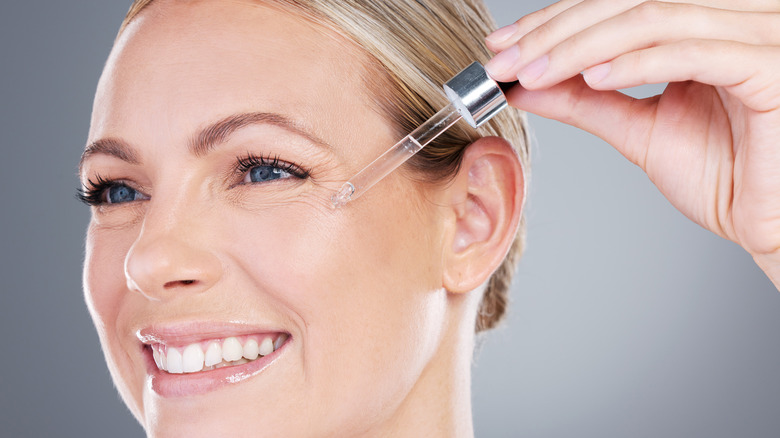Does Retinol Work Best If Applied On Wet Or Dry Skin?
If you've spent even a few minutes reading about skincare products or have been exposed to skincare advertising, it's virtually guaranteed you've heard the word retinol. But what is it, and why is it considered such a staple in so many skincare routines?
Retinol is the word commonly used to refer to a particular derivative of Vitamin A (via Everyday Health). Retinol is said to assist with cell turnover in the skin, making it an ideal ingredient for anti-aging and wrinkle-reduction. It's also a common ingredient in topical medications used to treat skin conditions like acne and hyperpigmentation. Along with encouraging cell turnover, retinol works by reducing sebum production (oil) in people who have an overproduction of it, by promoting collagen production, and by reducing redness and swelling thanks to its anti-inflammatory properties (via Skin.Software).
And while how, when, and how often to apply your over-the-counter retinol or prescription retinoid will depend on the particular recommendations of each product and/or your healthcare provider, there are some rules that apply to every retinol product in order to get the best results.
Should you dry your face before applying retinol?
Whether you have a several-step skincare routine or you prefer to keep it simple, your retinoid product should always be applied at the same point in your routine. First, make sure to cleanse your face with your preferred face wash or bar. It's a good idea, when just beginning a retinol routine, to use a gentle cleanser until you see how your skin reacts to the retinol. If you use a toner, that's your second step, followed by your retinol. If you don't use toner, your retinol immediately follows cleansing. However, whether you apply your retinoid post toner or post cleansing, you need to make sure your skin is fully dry before applying it.
As Dr. Brendan Camp, a dermatologist from Manhattan, told Pure Wow, you'll want to wait until your skin is fully dry before applying your retinoid product because this "can help mitigate any potentially irritating side effects because the product may not penetrate as deeply into the skin as it would if it was still damp." Depending on the concentration and strength of your retinol product, irritation can occur, especially when first introducing your skin to retinol, so this is a good way to help prevent any unpleasant side effects.
There are also a few other things you can do to make sure you are treating your skin as kindly as possible while using a retinol to help it remain calm and hydrated.
How to keep your skin healthy and happy while using retinol
Something you absolutely need to know about retinol is that while it can do a lot of positive things for your skin, it does also make it more sensitive to UV light (via Vogue). As such, unless you have been directed to do otherwise by a doctor, you should only use your retinol product, whether over the counter or prescription, at night. Further, you need to make sure that every single day, even if you spend very little time outside, you use a broad-spectrum sunscreen with a protection rating of at least SPF 30. This will help you to protect your skin from any photodamage while using your retinol.
Additionally, it's a good idea to use a good moisturizer at night after applying your retinol. Which you choose is entirely up to you and will depend on your skin's particular needs. If you have a prescription retinoid that you're using to treat a medical condition, it's a good idea to as your doctor for their recommendations about moisturizers and other products to use and avoid while using the retinoid in order to keep your skin as happy and healthy as possible


